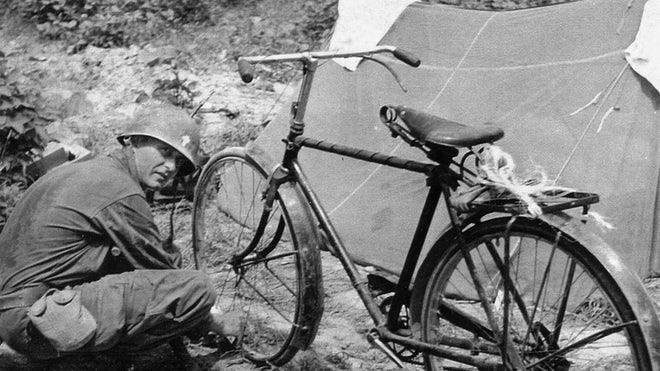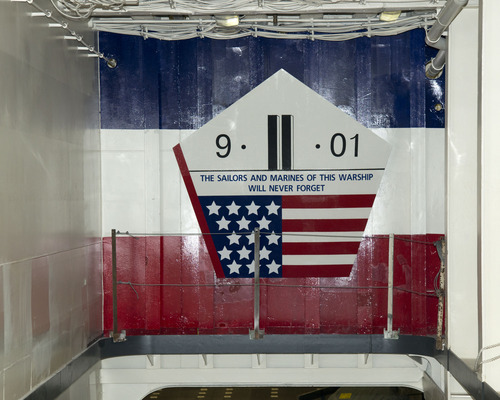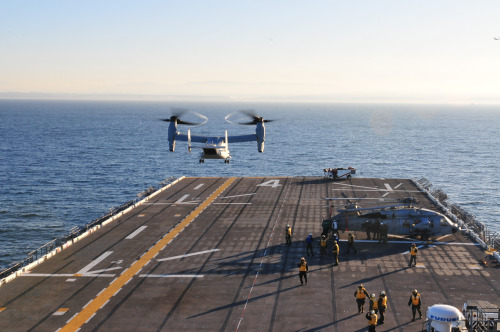
In this Aug. 11, 1950 photo provided by Col. Raymond A. Skeehan via the U.S. Army, the Rev. Emil Kapaun repairs his bicycle in Korea. (AP)
The Rev. Emil Kapaun was weak, his body wracked by pneumonia and dysentery. After six brutal months in the hellish camp, the once sturdy Kansas farmer's son could take no more. Thousands of soldiers had already died, some starving, others freezing to death. Now the end was near for the chaplain.
Lt. Mike Dowe said goodbye to the man who'd given him hope during those terrible days. The young West Point grad cried, even as the chaplain, he says, tried to comfort him with his parting words: "Hey, Mike, don't worry about me. I'm going to where I always wanted to go and I'll say a prayer for all of you."
Lt. Robert Wood wept, too, watching the Roman Catholic chaplain bless and forgive his captors. He helped carry Kapaun out of the mud hut and up a hill on a stretcher after Chinese soldiers ordered he be moved to a hospital, a wretched, maggot-filled place the POWs dubbed "the death house." There was little or no medical care there. Kapaun died on May 23, 1951.
These two soldiers -- and many more -- never forgot their chaplain. Not his courage in swatting away an enemy soldier pointing a gun at a GI's head. Not his talent for stealing food, then sneaking it to emaciated troops. Not the inspiring way he rallied his "boys," as he called them, urging them to keep their spirits up.
The plain-spoken, pipe-smoking, bike-riding chaplain was credited with saving hundreds of soldiers during the Korean War. Kapaun (pronounced Kah-PAHWN) received the Distinguished Service Cross and many other medals. His exploits were chronicled in books, magazines and a TV show. A high school was named for him. His statue stands outside his former parish in tiny Pilsen, Kan.
But one award, the Medal of Honor, always remained elusive.
Dowe and other POWs had lobbied on and off for years, writing letters, doing interviews, enlisting support on Capitol Hill. Dowe's recommendation was turned down in the 1950s.The campaign stalled, then picked up steam decades later. Kapaun's "boys" grew old, their determination did not.
Now it has finally paid off.
On April 11, those two young lieutenants, Dowe and Wood, now 85 and 86, will join their comrades, Kapaun's family and others at the White House where President Barack Obama will award the legendary chaplain the Medal of Honor posthumously.
"It is about time," Dowe says.
Even now, Father Kapaun's story may still have one final chapter: sainthood.
The Korean conflict is sometimes called "the forgotten war," overshadowed by the global cataclysm of World War II and the nation's long struggle in Vietnam.
For veterans, though, there are vivid war memories: the desperation of eating weeds plucked from the dirt, the horror of discovering buddies who'd died overnight, the evanescent joy of taking a few puffs on their chaplain's pipe. Many men of the 3rd Battalion, 8th Cavalry regiment, credit Kapaun for their survival, emotionally and physically.
"He's in my prayers every night," Dowe says. "I ask him to help me rather than asking God to help him."
Dowe first talked about the chaplain in a told-to story in the Jan. 16, 1954, issue of The Saturday Evening Post. He described Kapaun as "the bravest man" and "best foot soldier" he'd ever known, a humble guy with a wry sense of humor (he made a game of counting lice on their uniforms) and a fierce desire to help others.
Every POW remembers something special about what Kapaun did to help the soldiers.
He'd pound rocks on bombed-out tin roofs to shape them into pans he used to wash the wounded.
He'd pray to St. Dismas, the Good Thief, before he foraged in sheds and fields, stuffing corn, peaches and other food in his pockets, then giving it all to starving soldiers.
He'd drag the injured into ditches, risking enemy attack, or haul them on stretchers in the snow, gently urging others to do the same. "Come on boys," he'd say, "Let's help these guys."
He'd hop on his rickety bike -- his Jeep had been demolished -- every time he heard gunfire, racing toward the action, zipping across rice paddies in his knit cap fashioned from a sweater arm.
"He figured somebody needed help or last rites," Wood says. "We used to call him To-The-Sound-of-the-Guns Kapaun."
Wood recalls how the chaplain once joined him on the front lines when the lieutenant volunteered to deliver ammunition to some troops. As he raced up the hill, Kapaun appeared with bandoliers wrapped around him.
"What are you doing, father?" a surprised Wood asked.
"I'm going with you, son," the chaplain told the lieutenant, who at 22 was about a dozen years younger.
About halfway up, they were fired upon, Wood says. Both jumped into a ditch. The trusty pipe Kapaun had clenched between his teeth had been reduced to a mere stem.
"Father, you still want to go?" Wood asked.
"Keep going, son," Kapaun replied.
Such feats were cited when it was announced in March that Kapaun would receive the Medal of Honor. The White House and Army cited the chaplain's "extraordinary heroism" during the Battle of Unsan in Korea, walking through "withering enemy fire" to comfort and provide medical help, staying with the troops though capture was almost certain, leading prayers at the risk of punishment and resisting re-education programs by the Chinese Communists.
Also mentioned was an incredible life-saving episode.
It was November 1950 when Chinese soldiers overran the U.S. troops near Unsan. Sgt. Herbert Miller, a hardened World War II vet, was huddled in a ditch, his ankle broken from a grenade attack. He played dead for a time, hiding beneath the corpse of an enemy soldier. But he was ultimately discovered by another.
Miller picks up the story six decades later:
"He pointed his gun at my head. I was looking into the barrel. I figured to myself: `This is it. I'm all done."'
Then almost miraculously, Miller saw a slender GI approaching across a dirt road. As he neared, Miller noticed a small cross on the soldier's helmet. Kapaun simply pushed the enemy aside -- shockingly, without retribution.
"Why he never shot him," Miller says, "I'll never know. I'll never know. ... I think the Lord was there directing him what to do."
Kapaun reached down, scooped up Miller and carried him on his back as they were taken captive.
"Put me down. You can't carry me," Miller repeatedly told Kapaun. And he recalls the chaplain's reply:
"If I put you down, they'll shoot you."
Kapaun carried the wounded sergeant, or supported him, hobbling on one foot, until they arrived days later at the village of Pyoktong, where a POW camp was eventually established.
It was there on Easter Sunday 1951 that Kapaun, defying his captors, conducted Mass with a makeshift crucifix on a brilliantly sunny day. At the end of the service, Dowe recalls, the hills and valley echoed with the prisoners singing "America The Beautiful."
By then, Kapaun, a patch covering one injured eye, was very sick. About a week later, he almost died from a blood clot in his leg. But he kept going.
"As the kids say, he didn't just talk the talk, he walked the walk," Wood says. "When I think about him, I get all choked up. It was chaos. It was hell. To have this one man who still had the spark of civility in him -- it was an inspiration."
Back home, Dowe set out to have Kapaun's heroics recognized.
After the Saturday Evening Post piece, Dowe made a bid to have him awarded the medal. It failed.
The POWs talked about it at reunions over the decades, two Kansas congressmen tried, once in about 1990, and then about a decade later. Around the same time, a new champion entered the picture.
William Latham Jr., a retired lieutenant colonel, teacher and historian, was interviewing several soldiers held captive with Kapaun while researching a book, "Cold Days in Hell: American POWs in Korea." They told moving stories and urged Latham to take up their medal cause.
Latham scoured the National Archives, gathering evidence of Kapaun's deeds in battle and captivity. He found the chaplain's service documents and eyewitness accounts from Unsan. He collected affidavits from the obliging POWs.
Latham understood the nominating process, the rules and hurdles in securing the medal -- especially after decades pass -- so he was sure to compile a thorough case. He sent more than 5 pounds of material to Kapaun's family and urged it be shared with the local congressman, who gave it to the Army.
This time, there was success. Latham was thrilled -- and not just for the chaplain's memory.
"Emil Kapaun didn't need a medal to prove his heroism, but this recognition is very important to the men who served with him and to the families of the many other POWs who never came home," he says. "How many chances do any of us have to recognize so many unsung heroes?"
But there's still unfinished business in Pilsen, where townsfolk hope Kapaun will one day be elevated from war hero to saint.
Around this hamlet of just 22 homes, Kapaun's name already has mythical status. Everyone knows the story of the modest farm kid who became an Army chaplain in 1944, served two years along the India-Burma border and returned to the military in 1948 for a second stint -- dying at age 35 in captivity in Korea.
Today, there's a Father Kapaun Day every June at his former parish, St. John Nepomucene Catholic Church, a nearly century-old red brick building with a 115-foot steeple. Inside there's a museum celebrating Kapaun's life; outside a life-sized bronze statue of the chaplain, an Army captain, helping a wounded soldier.
An hour away, the Rev. John Hotze, judicial vicar of the Wichita Diocese, has been leading the case for sainthood.
When he officially started the project in 2008, he says, his first task was to look for any reasons Kapaun wasn't worthy. The closest thing to a flaw he found, he says, was a doctor in the POW camp who'd been frustrated because Kapaun, as a patient, gave his food to those he felt were needier. "That," he says, "was the worst anybody said about Father Kapaun."
Over the next three years, Hotze, with a team of researchers, presented a 160-question survey to some 55 people who knew Kapaun from his childhood to his dying days. Personal interviews were conducted around the country and an 8,000-page record was amassed of every word written about and by Kapaun, including some 1,500 articles and even his homilies, some of them in Czech. (The Kansas-born chaplain learned his parents' ancestral language.)
A postulator in Rome will assemble the case for canonization, which is ultimately decided by the pope.
Two miracles are needed, and Hotze says there are potential candidates: a college student who suffered a life-threatening head injury in a pole-vaulting accident but recovered and teenage girl who healed from liver and lung disease, without any need for dialysis. In both instances, Hotze says, their families and friends prayed to Kapaun for his intercession.
After three years of exploring Kapaun's life, Hotze says what stands out is his selflessness in extraordinary times.
"If we were in the same position as Father, our focus would be on `how am I going to survive?"' he says. "For Father Kapaun it was `how am I going to help other people to survive?' That sums up his life."
Ray Kapaun was born after his uncle died, but he grew up hearing about him from his grandmother.
"In everything that Emil did, he led by example," Ray Kapaun says. "He wasn't a preachy person. He never expected anything from anybody that he wouldn't do himself."
The medal, he says, is both a family honor and a history lesson.
"It's a huge validation but it's almost an opportunity for a lot more people to know and see what kind of man he really was," he says. "I still read stories about him and get teared-up about what he did."
Ray Kapaun, now 56, will accept the medal on his family's behalf. He'll be joined by two other nephews and a niece of the chaplain. Kansas political leaders, Latham, the historian, Hotze, others members of the Wichita Diocese and the Pilsen parish will be there, too.
And, of course, the POWs.
This day, Ray Kapaun says, would never have arrived without their persistence. Some didn't live to witness the ceremony, but others will finally see their beloved chaplain given the recognition they've called for so long.
"What he did and what he meant is so important," Dowe says. "It's worth finding a way to carry that forward. ... I can only say I'm glad it's happening. It's a shame it couldn't have been sooner."




